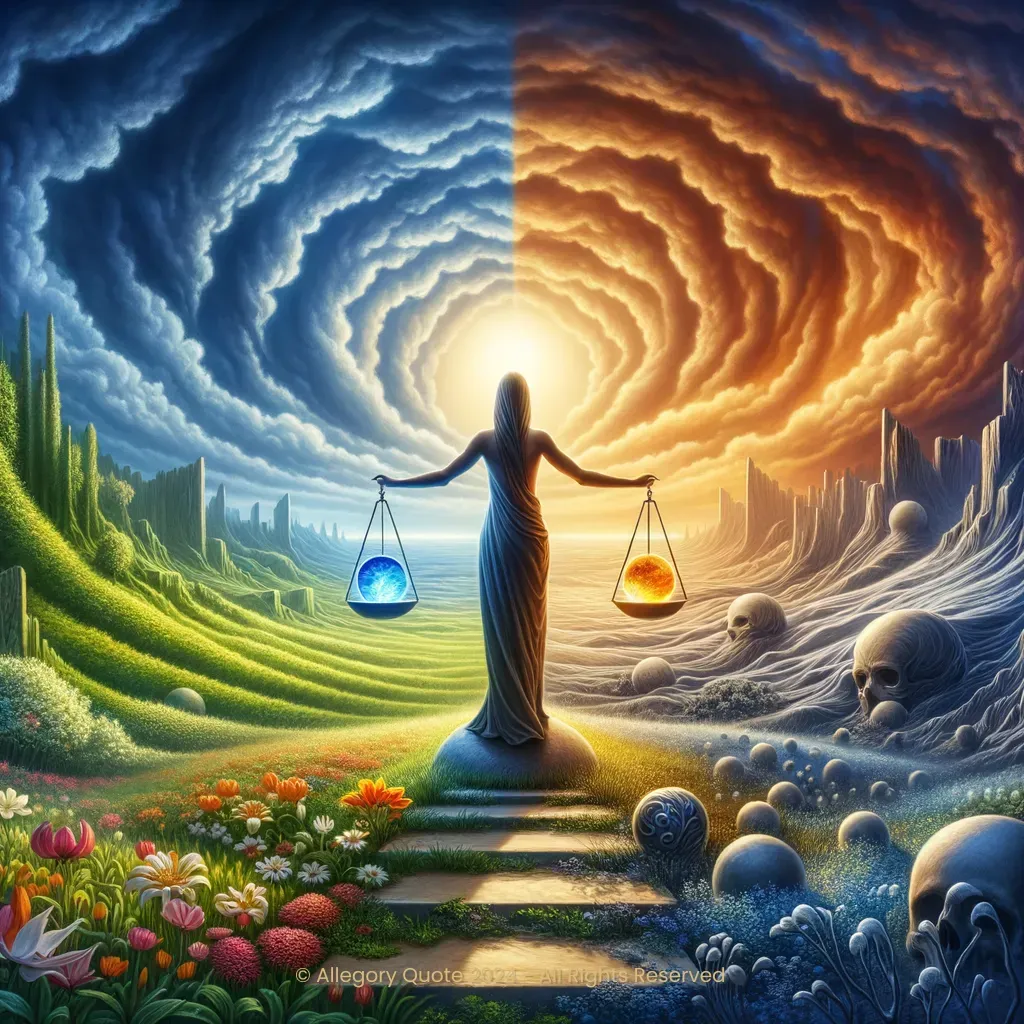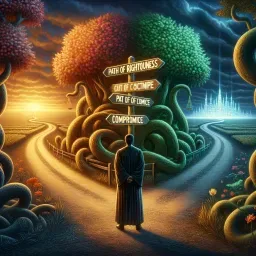”There is nothing either good or
bad but thinking makes it so“

0
0
0
0
- Meaning
- The meaning of the phrase delves into the philosophy of relativism. It suggests that nothing in itself is inherently good or bad; it is our perceptions and thoughts about things that assign these values to them. This idea emphasizes the power of the mind in shaping our reality and how subjective our experiences and judgments can be.
- Allegory
- The human figure symbolizes the individual experiencing and interpreting reality. The shifting landscape illustrates the varying perceptions of situations—one being positive and vibrant, the other negative and harsh. The balance scale with glowing orbs demonstrates that it is our thinking that tips the scales towards either a positive or negative perception. The serene expression of the figure represents the peace that comes from understanding and mastering one's thoughts, reflecting the core message of the quote that our perceptions shape our experiences of good and bad.
- Applicability
- In practical terms, this phrase can encourage people to reframe their thoughts and attitudes. For example, difficult situations can be viewed as opportunities for growth instead of purely negative experiences. It invites a mindset that finds silver linings and promotes resilience and positivity by understanding that our thoughts and attitudes heavily influence our emotional responses and outlook on life.
- Impact
- Shakespeare's exploration of human nature and thought has had a lasting impact on literature, philosophy, and psychology. This specific phrase is often cited in discussions about cognitive behavioral therapy (CBT), which emphasizes how our thoughts influence our feelings and behaviors. It has inspired many to explore the subjectivity of human perception and the power of the mind.
- Historical Context
- While the exact date may not be pinpointed, "Hamlet" was written around 1600-1601. The phrase's context in the play supports Prince Hamlet's philosophical ponderings and inner conflict as he navigates complex moral and existential questions.
- Criticisms
- One criticism might be that this perspective can overlook objective realities. For example, certain actions, such as injustice or harm to others, might be inherently bad regardless of personal interpretation. Critics argue that while perception is powerful, it should not be used to nullify the existence of universally unethical behaviors or societal structures.
- Variations
- Variations can be found in other philosophical and cultural traditions. In Eastern philosophy, particularly in Buddhism, the concept that suffering arises from our attachments and perceptions aligns with this idea. Across different cultures, the notion that perspective shapes reality is a common motif.
-

To weep is to make less the depth of grief.
-

To do a great right, do a little wrong.
-

What's in a name? That which we call a rose by any other name would smell as sweet.
-

When sorrows come, they come not single spies, but in battalions.
-

I must be cruel, only to be kind.
-

Good night, good night! Parting is such sweet sorrow.
-

know what were good to do, chapels had been churches, and poor men's cottages princes' palaces.
-

Certus anceps.
-

I am a man more sinned against than sinning.
-

I am not bound to please thee with my answers.
-

Things without all remedy should be without regard: what's done is done.
-

To be, or not to be, that is the question.
No Comments